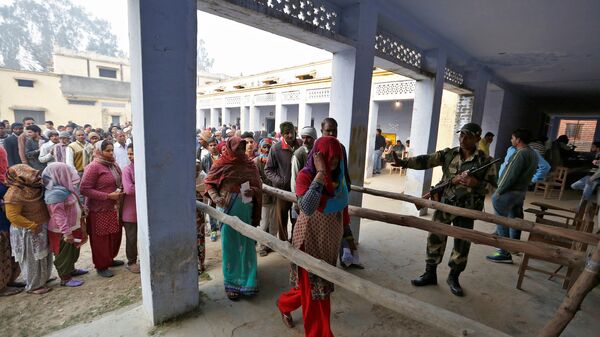New Delhi (Sputnik): The world's second most populated country, India, will go to polls in the second week of April and the results which will decide the new government for the South Asian bicameral democracy, which has a tenure of five years for its central government. Polls to the lower house, the Lok Sabha, were announced today.
The Election Commission of India, in a media briefing on Sunday evening, declared that the parliamentary election will be held in seven phases beginning from 11 April 2019, while the counting of votes will be held on 23 May.
The current term of the Narendra Modi-led BJP government will expire on 3 June, and Lokasabha Elections will be held in seven phases.
1st phase- 11th April
— Election Commission of India (@Election_offic) March 10, 2019
2nd Phase- 18th April
3rd Phase- 23rd April
4th Phase- 29th April
5th Phase- 6th May
6th Phase- 12th May
7th Phase- 19th May
Counting- 23rd May#Election Commission Of India
The term of the present #LokSabha ends on 3rd of June 2019 — Chief Election Commissioner #SunilArora pic.twitter.com/v2ZxTWADd7
— All India Radio News (@airnewsalerts) March 10, 2019
"Around 900 million citizens are eligible to cast their vites in 2019 general election against 814.5 million in 2014 election", Sunil Arora, the country's chief election commissioner, said while briefing media on Sunday in New Delhi.
Interestingly, a whopping 15million first-time voters in the age group of 18-19 years will cast their ballots in the 2019 polls.
Sunil Arora, Chief Election Commissioner: Total electorate in this Lok Sabha elections will be 900 million, of which 15 million voters are in the 18-19 age group. pic.twitter.com/LyqvJtu3gQ
— ANI (@ANI) March 10, 2019
This year, electronic voting machines will have pictures of candidates to avoid discrepancies, Arora added.
Around 900 million voters will cast their ballots to elect 543 lawmakers to India's lower house of parliament.
The world's largest democratic exercise will witness Prime Minister Narendra Modi run for a second term against a large opposition coalition led by Rahul Gandhi, the scion of the Gandhi-Nehru family.
READ MORE: India's Election Watchdog Refutes American Hacker's Rigging Claims, Files Plaint
Reportedly, Prime Minister Modi is facing a major backlash from youth and farmers as the slowing economy has failed to generate desired results for them. Rahul Gandhi has also been raising the issue of corruption in the $8.7 billion Rafale fighter jet purchase from France.
Nevertheless, the governing Bharatiya Janata Party is seeking to win the support of alienated voters by raising the issue of national security in the polls, a tendency that the Election Commission has advised against for all the political parties.



